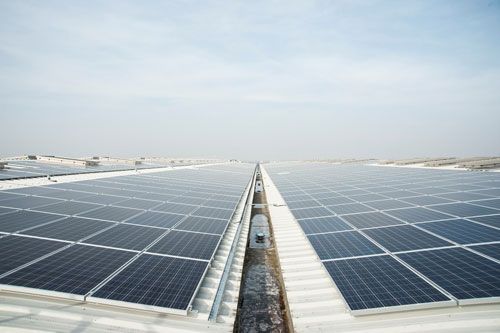
Whilst giving evidence at a Parliamentary committee, the secretary of state for energy and climate change, Amber Rudd, confirmed that it was ‘difficult to say’ if the UK was on track to meet its 2020 renewable energy target of 15% of all energy from renewables. The UK target is lower than the pan-EU target of 20% because the UK has always trailed most other European countries on renewables deployment. In the letter, Amber Rudd confirmed that the UK is on track to reach just 11.5% Renewable Energy by 2020 – leaving the UK at risk of delivering only slightly more than half the contribution from renewables as the rest of Europe.
The secretary of state also confirmed that they were looking at making up the targets potentially from importing renewable power from overseas. Ms Rudd also highlighted the potential to increase the role of renewable transport, while underlining the Department for Transport’s focus on electric vehicles. There is nothing in the EU Renewables directive that stipulates the share of the 15% between electricity, heat and transport.
This comes on the back of the severe cuts the solar PV sector has experienced in the past months, which were made to look even more dubious with the news that an opinion poll from the Department of Energy & Climate Change (DECC) states that solar is the nation’s favourite source of energy at 80%, this is higher than every other renewable or conventional energy technology.

Leonie Greene, head of external affairs at the Solar Trade Association said: “These very high levels of public support for solar show yet again that this sunshine technology is the nation’s favourite source of energy. No other technology empowers consumers and communities to take charge of their energy bill and, by cutting support for solar the government is taking power away from the people.
“It is clearly absurd to be decimating the most cost effective renewable power technologies while exploring the potential to make up the UK renewable target shortfall by importing renewable electricity from overseas. The solar industry has already seen the Government prioritise public support towards more expensive overseas utilities over British solar. It is very difficult to understand the lack of interest in supporting British companies.
“The secretary of state herself said she would rather meet the target at home so why is she decimating our industry & looking for electricity from overseas?”
The STA is extremely keen to see action on renewable heat, a sector highlighted by the secretary of state. The UK is exceptionally poor on renewable heat and it has almost the lowest contribution in Europe. The solar thermal market has collapsed in recent years due to inadequate support.
The Solar Trade Association’s £1 rescue plan for solar power would deliver 2.7GW of solar power by 2020. This amounts to just 0.17% of total energy in 2020 – the UK renewable energy target is 15% – leaving huge scope for advancing the heat and transport sub-targets. However, the £1 Plan would safeguard the solar power sector.
Leonie Greene said: “We are all for urgent action on renewable heat, but a sensible approach to renewable power does not, as Rudd suggests, mean ‘abandoning’ heat. There is plenty of scope to strongly ramp up renewable heat while providing a sensible framework to safeguard public investment in the British solar industry. It is not either/or. We are not on track to meet the 2020 targets, investor confidence has been severely damaged by recent policy chaos, the world is half way to dangerous climate change – the UK does not have a minute to waste to get its solar industry back on track.”
The STA says that logic would dictate that if the UK is falling short in renewable heat, which now looks inevitable, it should make every effort to improve performance but also make up the shortfall in electricity, given the difficulties of making progress on transport. The Association believes this is especially true if electric vehicles are going to be a contributor to the transport target as the secretary of state suggested.



